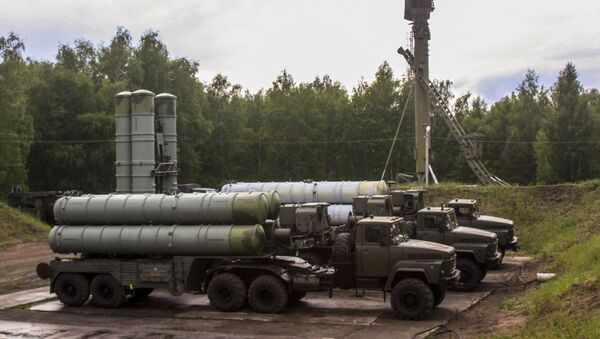Sputnik: What is your assessment of Russia’s decision to deliver a modern air defense system to Syria?
Marcello Ferrada de Noli: The decision is hardly a surprise. There is a long chain of developments here, leading to the final implementation of the S-300 [being supplied] to the Syrians –I mean, concretely, to the Syrian military. Otherwise, the deployment to the main Russian military bases in Syria of the S-300, and even S-400 systems, is already a known fact [as it happened at a] much earlier date.
So, as I say, this can hardly be considered a total surprise, or an abrupt escalation out of the blue, as the Western media more or less are presenting the events.
The difference here has been made not by Russia, but by the Israeli attack on Latakia, which ended in the downing of the Russian aircraft and the demise of its total crew of servicemen, 15 Russian lives. And that's the new development. I would suppose that a main aspect comprised in the final agreements between Israel and Russia – [during] these years of halting the [deployment] of S-300 systems for the Syrian defenses– it must have been also a pledge by the Israeli Air Force to never cause damage to the Russian military there, let alone events that could result in the killing of Russian military personnel.
READ MORE: 'With War or With Peace': Damascus Vows to Regain Control of Whole Syria
The second aspect, which in my opinion should deserve more focus in the current geopolitical analyses and media reporting on the “S-300” issue, is that the defense system to be delivered to Syria is a modern, updated defense system which includes mechanisms able to distinguish with heightened precision ‘foes’ from ‘friendly’ aircraft. So, the sending of the S-300 is clearly aimed to protect the lives and increase the security of Russian servicemen stationed in Syria. This is the real emphasis and corresponds to what the Russian authorities centrally meant when they announced they will take an “appropriate response” regarding the Latakia incidents.
Sputnik: In your view, will that help prevent further accidents?
Marcello Ferrada de Noli: Referring to the security of Russian servicemen in Syria, definitely yes. It also may help to deter any other power [from launching an airstrike on] Syria, particularly in the proximity of Russian deployments.
Sputnik: What is Israel’s reaction likely to be?
Marcello Ferrada de Noli: According to Lieberman, Israel’s Defense Minister, the IAF would destroy any site aimed to attack its aircraft. But I believe that such statement was more intended to be heard by Israel's domestic politicians. Also, the statement could end up being a political boomerang for Israel. I mean, everybody understands that the S-300 is a defense system, an antiaircraft system activated only by an attack –which in the case of the Israel Air Force, non-provoked attacks constitute a violation of international law, not only an infringement of Syrian airspace. Lieberman's' announcement also conveys his announcement of further such violations of international law, subject to be condemned by the EU and the international community.
Sputnik: How would these affect relations between Russia and Israel?
Marcello Ferrada de Noli: So far, and for a long time, the relations between Russia and Israel have been characterized as good and [dictated by] 'realpolitik'. Several conflict situations in the past regarding the Syrian issue have been solved politically and diplomatically, including through direct contact, by the two countries. This empirical observation may anticipate that it will be the same in the future.
READ MORE: 'Are We in For a Nightmare?' – Israeli Media on S-300 Deliveries to Syria
However, the new political situation in Israel may somehow protract the reaching of an understanding on the current issue (the Latakia attack, S-300, etc.). As I see it, there might be a certain ‘competition’ among the political parties forming the government coalition as to how presenting the patriotic or nationalistic message more clear to the [voters] in the upcoming polls. For instance, media reports indicate that the party of Minister of Defense Lieberman is losing support to the party of Mr. Netanyahu.
Sputnik: Russia’s military has accused their Israeli counterparts of ‘ungratefulness’ following the incident. Do you agree with this assessment and why?
Marcello Ferrada de Noli: There is a context issue here, which is whether the Russian presence in Syria –and I focus here on Russia as a peace-broker power– has been contributing as a stabilization factor in the Middle East. The effects of that endeavor by Russia have benefited the area as a whole, specifically those in Israel and elsewhere favoring political solving-strategies instead of sterile ‘to-the-bitter-end' military options which, as we have seen, have not [led to] any durable peace over there.
READ MORE: Russia's S-300 Will be Able to Close Parts of Syrian Airspace — Moscow
Then we have some concrete measures adopted by the Russian command, for instance, the patrolling in the Golan Heights, etc. The main contribution to Israel that those activities have signified, so far, has been the decreasing or even relatively absence of significant attacks [on] Israel from Syria territory, into Israel by the different forces traditionally considered Israel enemies. I mean, the presence of Russia in Syria has been a moderate factor, if you take it from the perspective of Israel.
And the above contrast with the Israeli airstrike-campaign, of over and over again targeting sites they say [have considerable importance] for Israeli strategic defense.


